feature image by Hunter Abrams
I.
Russian-Speaking American LGBT, or RUSA LGBT, meets in the basement of Congregation Beit Simchat Torah on Wednesdays – not for religious reasons but because the space is free. They meet every Wednesday in a room that’s well-lit but bare except for long plastic tables, chairs and a large blue Star of David on the wall. Around 16 people show up, mostly gay men in their 20’s or 30’s. They come from across the ex-Soviet periphery: Russia, Moldova, Kazakhstan, Uzbekistan, even China.
The first meeting I went to was last September, a few days before Yom Kippur. The conversation was dominated, as it often is at RUSA meetings, by the group’s president and mother hen, Lyosha Gorshkov. Gorshkov, 32, was a professor back in Russia, and will always be a professor, though right now he works during the day as a care manager for people with HIV, substance abuse and mental health problems. But at RUSA LGBT meetings, he sits at the head of the table with a red notebook in front of him and educates, gesticulates, occasionally sings and gleefully gives his acerbic opinions on every topic that flies through his mind.
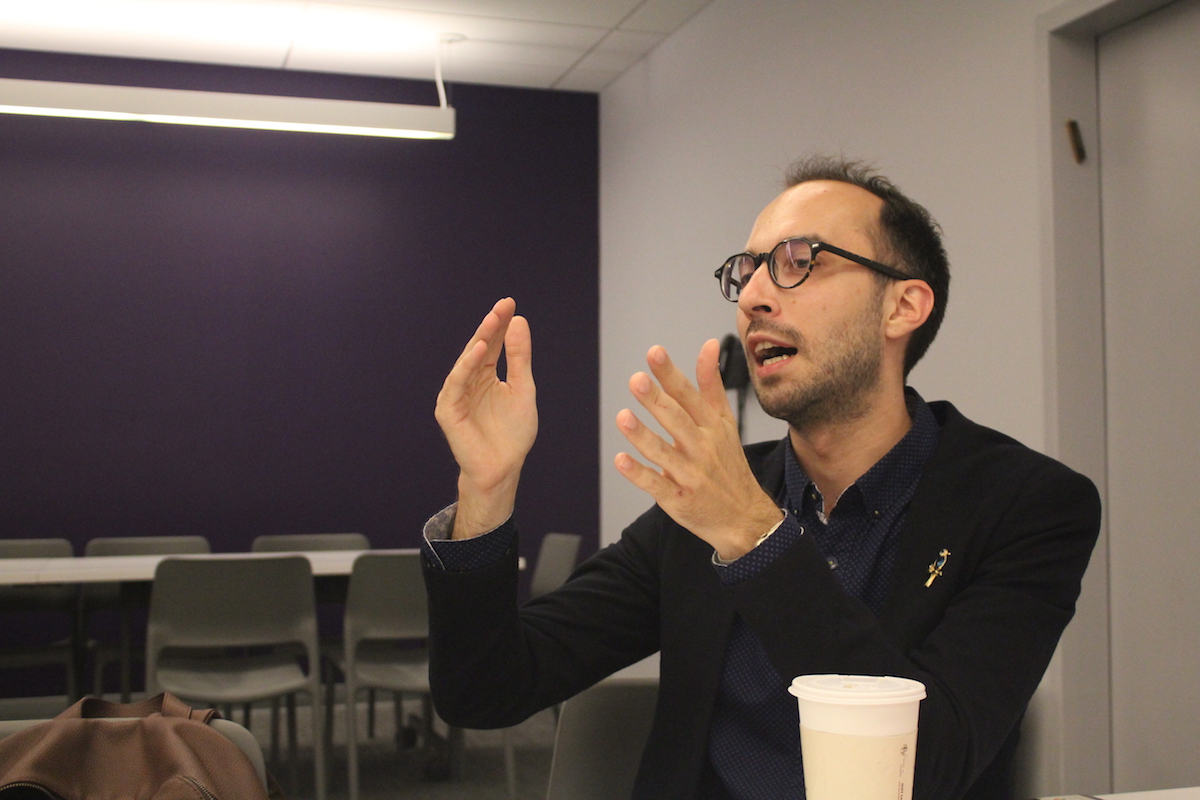
Lyosha Gorshkov speaking at a RUSA LGBT meeting. Photo by author.
This Wednesday, as most Wednesdays, he was talking about immigration. The conversation was a mix of English and Russian, the Russian punctuated with English phrases like “SSN,” “alien number,” and “work authorization.” Gorshkov complained, without really complaining, that too many gay men were asking him to help them find an American husband.
“I’m not a marriage bureau!…I’m mother, but not matchmaker,” he said in English. He wore hipsterish horn-rimmed glasses and held a coffee cup with a logo of a man who was also wearing hipsterish horn-rimmed glasses.
He has always been, in his own words, a “non-conformist.” He has joined in protests against the Sochi Olympic games and against human rights abuses in Chechnya. He threw bottles of vodka at the Metropolitan Opera as part of a demonstration against soprano Anna Netrebko (“very outrageous and absolutely stupid in terms of politics,” he told me in an interview). He was part of a different Russian-speaking LGBT support group, but left after clashing with other members.
In Russia he was openly gay and had been promoting queer studies since 2005. He taught political science at a university in Perm, focusing on LGBT and gender studies. Right-wing articles called Gorshkov “a propagandist of pedophilia” and demanded that he be fired. He said that his apartment was watched; he got threatening phone calls in the middle of the night; “I was beaten up a couple of times.” He finished the school year, to avoid suspicion, then left for a vacation to the United States in the summer of 2014. It’s unlikely that he’ll ever go back.
Nearly all the members are trying to apply for asylum in the U.S. based on persecution in their home countries, or have already gotten it. Hate crimes against queer people in Russia doubled from 2011 to 2015, according to a study from the Russian-based Center for Independent Social Research – goaded on by a 2013 law that banned ‘gay propaganda.’
Every few weeks, RUSA hosts a free legal aid clinic run by SAFE (Seeking Asylum and Finding Empowerment). Nearly all the members are trying to apply for asylum in the U.S. based on persecution in their home countries, or have already gotten it. Hate crimes against queer people in Russia doubled from 2011 to 2015, according to a study from the Russian-based Center for Independent Social Research – goaded on by a 2013 law that banned ‘gay propaganda.’ (An English summary of the study can be found here.) The study found records of 250 crimes since 2010, of which 200 were murders, likely because lesser crimes would go unreported.
While Donald Trump has aimed his political fire at refugees, asylum seekers are different. Refugees don’t step foot on U.S. soil until they’ve been thoroughly vetted and paired with a resettlement agency that’s ready and waiting to support them. Asylum seekers to the U.S. arrive on another pretext – say, a tourist or student visa – and then apply. The Department of Homeland Security had a backlog of over 311,000 asylum cases as of January 2018. In New York, the wait time to get an interview was around two years. Then, in an attempt to stem the backlog, Citizenship and Immigration Services announced that they were giving higher priority to the most recently-filed asylum cases. That means that those who were already part of the backlog would be delayed even further.
And life, for asylum seekers, already seems like an interminable process of waiting. They’re not allowed to work for at least 180 days. There’s no resettlement agency, no government support. In legal limbo, some turn to the shadow economy to make a living.
“You will be treated bad at work,” said one member of RUSA, who asked that his real name not be used. “People will use you. You will not be paid for your overtime and you still have to survive.”
Gorshkov had gotten the golden apple, asylum, so he spent much of the meeting answering everyone’s questions. Don’t travel outside the U.S., he advised people, and don’t go to Florida or Texas, there’s too many ICE officers there. Don’t trust lawyers who claim they want to help you for $5000. But also, don’t panic, don’t be a drama queen and don’t believe everything you read online.
Some questions during the interview that seem basic for Americans – like, “When did you realize you were gay?” – are difficult for people who grew up in countries where no one ever asked that question, where men and women refused to come out even to themselves.
The issue of the asylum interview was of particular concern. Some questions during the interview that seem basic for Americans – like, “When did you realize you were gay?” – are difficult for people who grew up in countries where no one ever asked that question, where men and women refused to come out even to themselves. And how are you supposed to show an immigration officer that you’re gay anyway? As one RUSA member asked, with a laugh, “How can you prove? ‘Fuck me right here?’”
After the conversations on asylum, it was time the plan out some activism. There was a protest happening in a few weeks that RUSA would help out with: organized by Voices 4 Chechnya, hundreds would march to protest the murder and torture of gay men in that region. And it was already time to start planning for Brighton Beach Pride in May. The year before, RUSA held the first-ever gay pride parade in the immigrant community of Brighton Beach, Brooklyn.
After the meeting, a few RUSA members hung around after the meeting to talk to me about life as refugees. There was Elvira Brodskaya, 35, a woman with dyed red hair and bright red lipstick set against milk-white skin. She and her wife, Anastasia Orlova, arrived in the US in October 2016. They’re still waiting for their asylum interviews.
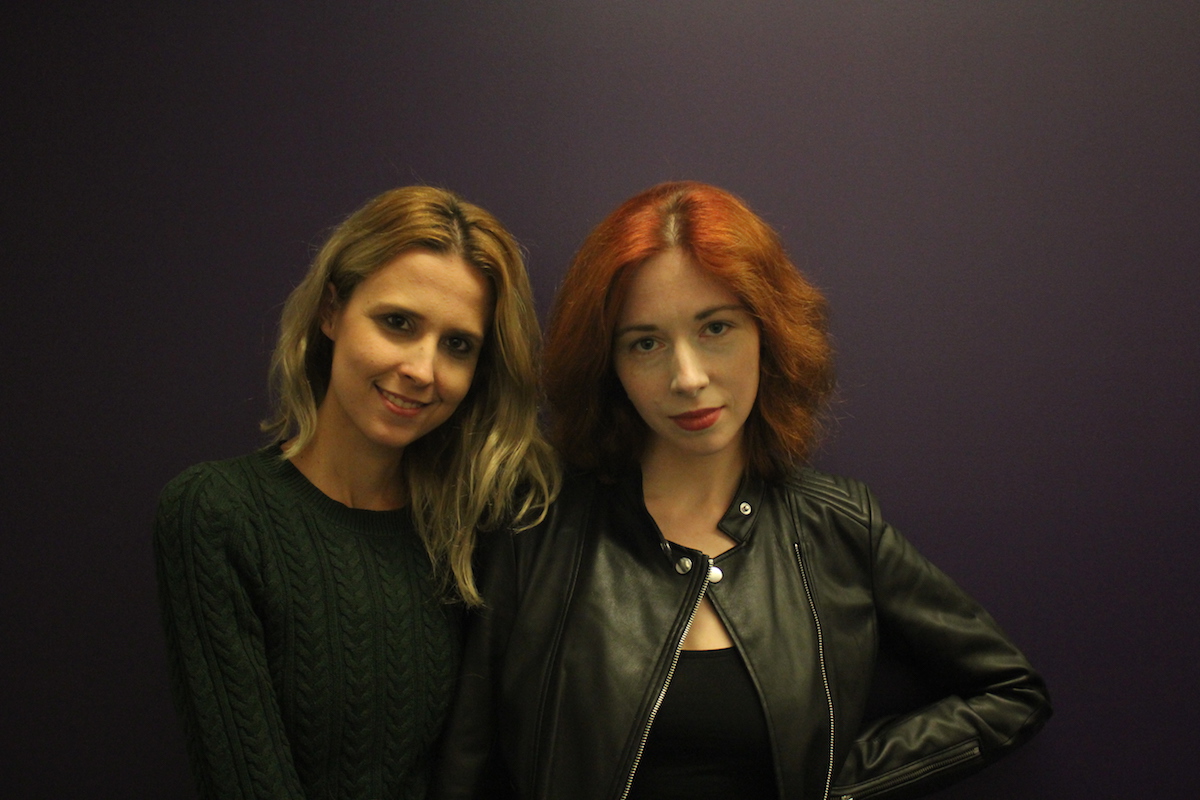
Anastasia Orlova (left) and Elvira Brodskaya (right) arrived in the U.S. in 2016. Photo by author.
Life in Russia meant being “under pressure every day, to be in the shadow ever day, to be in fear every day,” Brodskaya said.
She described exactly what she meant, later, in an e-mail; it was easier for her to write about the incident than to talk about it.
Brodskaya and Orlova lived on a narrow street in St. Petersburg. No one except closest confidants know they were married. The couple had the ceremony in Denmark, during a vacation, though they knew it wouldn’t be recognized back home. However, neighbors on the opposite side could easily see into their windows. “You can find out lots of things if you are curious and patient enough,” Brodskaya wrote.
A group of men across the street started to stalk the couple, angry that the women had no interest whatsoever in dating them. They left notes on the door; when the women wouldn’t answer the door, they shot through the window. Then, they shot Orlova.
“Why did it all happen? Because in Russia women are helpless,” wrote Brodsakaya. An unmarried woman “is nothing, and a lesbian…it’s even worse.”
“One day during the spring we were on the street, near the entrance door, and Anastasia felt pain in the leg,” wrote Elvira. “She thought it was a stone. But then she realized that her leg is covered with blood.”
Elvira thinks the weapon used was an air gun. Her wife was not seriously injured, but she could have been if she had been shot in the eye instead of a leg.
“Why did it all happen? Because in Russia women are helpless,” wrote Brodsakaya. An unmarried woman “is nothing, and a lesbian…it’s even worse.” The couple left Russia two years later.
II.
The story of every immigrant to America shares some elements. My own parents came from Russia, so I was familiar with the narrative: the struggle to adjust to a new culture, learn a new language, work up from nothing to a good American life. The story is a cloak that can fit on a traveler from any nation. What drew me to RUSA is that I realized the stories of queer migrants are different.
Few immigrants arrive alone. Once in America, there’s a community of other immigrants. Maybe they live in an ethnic enclave, like Brighton Beach. They may face nativism or discrimination, but they can at least turn to their own countrymen. But queer migrants usually come to the U.S. to flee their own countrymen.
“Whereas other immigrant communities can rely on diaspora communities, it’s usually not possible for LGBT forced migrants,” explained Edward Alessi, a Rutgers sociologist who studies queer migration.
And, he added, LGBT asylum seekers are more likely to struggle with depression and anxiety because of violence they faced in their past. So they must balance mental health issues on top of the universal struggle to adjust to life in a new world. The lack of support from the diaspora community makes support from the LGBT community all the more important.
“The level of resilience,” said Alessi, “is very extraordinary.”
Brodskaya is very close to her friends in RUSA, but when it comes to straight Russians, she avoids them. They have no interest whatsoever in living in a Russian enclave like Brighton Beach and never have.
“We didn’t feel a wish to communicate with them…There always is a fear you can meet a homophobic one and we just do not want to if we do not have a necessity to do that,” said Brodskaya.
“My wife didn’t want to lie, because she came not to lie,” said Brodskaya.
She remembers how her wife had trouble finding a job in Russian-speaking businesses. Bosses would ask her during the interview if she was married; they didn’t like her answer.
“My wife didn’t want to lie, because she came not to lie,” said Brodskaya.
Many immigrants also come to the US for the sake of their families. My dad always said to me, for example, that he didn’t want to leave the Soviet Union; he just did it so his kids wouldn’t have to put up with the same crap, like antisemitism, that he did.
None of the people I spoke to at the RUSA meeting came to the US with children. If they have family members back home who accept them, it’s unclear when, if ever, they’ll be able to see them again. Gorshkov told me he held too much bitterness against Russia to miss the country itself – “I don’t need Russia at all. I never loved it” – but he did feel the pain of leaving his mother. Brodskaya said she missed her mom too. But RUSA, in its own way, is a family.
“When you come to USA, you know literally nothing — how to get medical help, how to find a lawyer, how to rent a flat…you do not have friends, you feel like a fish out of the water,” explained Elvira. “Though I wanted to be here, it still was very hard to adapt.”
“I think that I understood what community means for the first time only because of RUSA.”
The RUSA meetings helped her find steadiness in the storm of immigrant life: “I think that I understood what community means for the first time only because of RUSA.”
Still, even other LGBT Russians can hold onto conservative views. After the first pride parade in Brighton, Gorshkov says he faced pushback from gay Russians who asked him, do you really have to do that here?
“Still got the same attitude that you have to just live your life, don’t show your identity publicly,” said Gorshkov.
Brodskaya says she understands why some LGBT Russians hold more conservative attitudes.
“It’s very hard to be free, when you are not used to it,” she said. “It’s a very common problem I think…For a lot of people borders are essential, because they can’t live without them. As for me, I believe freedom is the most important thing in life. That’s why I want to live in USA.”
Perhaps this is what separates the immigrants in RUSA from people like my mom and dad. Out of all of the immigrant groups, refugees and asylum seekers are the most demonized and feared. Yet, out of all the immigrant groups, they are the ones who came first and foremost for freedom. That makes them the most American immigrants of all.
III.
Anvar is 31, lean, with a short beard. He asked that his last name be withheld to protect family back in Uzbekistan. He grew up in Samarkand, a city whose name evokes images of Silk Road caravans and ancient minarets. It saddens him that Uzbekistan is mostly known to the world because of recent acts of terrorism. Last year, Uzbek men conducted terror attacks in Stockholm, Istanbul and St. Petersburg. On Halloween, a 29-year-old Uzbek immigrant named Sayfullo Saipov plowed his truck into a crowd in Manhattan, killing eight people.
Anvar wishes people associated his country with more than terrorism. He wishes they knew it was the center of early Islamic civilization, birthplace of great thinkers like the physician Avicenna and the mathematician al-Khwarizmi. He thinks that Saipov was someone who felt lost and alienated in a new country and found solace in religion. Anvar had an easier time adjusting to life as an immigrant, in part because he already knew English and in part because he had dreamt of America for so long.
“This was my dream…I was prepared for this,” he said.
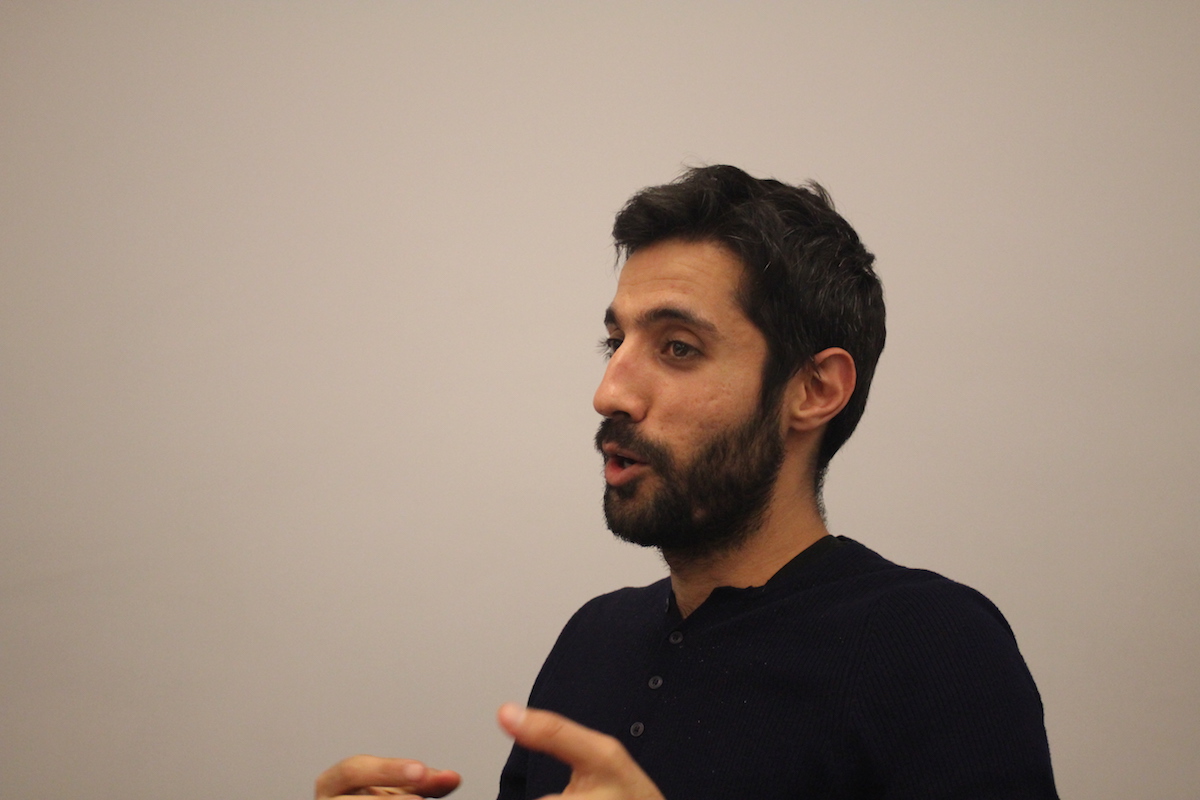
Anvar speaking at a RUSA LGBT meeting. Photo by author.
From an early age, Anvar felt himself to be strange and different. Something was wrong with him. He enjoyed playing with girls, and playing with boys for completely different reasons. He loved music: dancing, singing, piano. He got straights A’s in school. His talents made him popular but also a target for bullying in a patriarchal society.
“I was ashamed of being called a girl. I felt like I’m a disgrace to my family,” said Anvar.
He gave up music, retreated into himself. He preferred to be alone with his books. Giving up music made him feel reckless; he said this was an “ending point.” He made a plan: one weekend, when he was at his grandmother’s house, he would get some medication he had heard about from the pharmacy and commit suicide. He was around 12 or 13 years old.
“I actually planned it out and I was going to execute it,” he said, “but my English teacher saved my life.”
The same week that he was planning to commit suicide, he had found a private tutor, a “wonderful Russian lady who taught me English.” He didn’t confide to her that he was gay – he couldn’t tell anyone that – but learning a foreign language gave him hope that he could leave Uzbekistan one day. He could read new books, learn about different worlds, get a job far away and start a new life one day. He felt “as if someone was whispering to me, you have to learn this language.”
“I knew that I would always be seen in Russia as someone who has a different color skin, someone who is a foreigner,” he said.
Eventually he became a migrant worker in Russia, like his parents, like millions of Uzbeks before him. He stayed there for nine years, rising from busboy in a restaurant to general manager. In the first two years especially, he periodically got picked up by the police on dubious charges, and his parents would have to pay a bribe, around $10, to get him out. He studied linguistics at a Russian college and spoke Russian perfectly, but knew he would never be seen as a Russian.
“I knew that I would always be seen in Russia as someone who has a different color skin, someone who is a foreigner,” he said.
Between his skin color and his secret homosexuality, “I never felt safe.” He came to the U.S. almost four years ago, on a student visa, to study hospitality at Monroe College. At the same time, he applied for asylum, arguing that he feared persecution as a gay man in Russia and Uzbekistan.
The country has its flaws, he admits – and he’s no fan of Trump – but it’s “paradise” compared to Uzbekistan.
After four years, he already feels totally assimilated. He lives with his American boyfriend in Brooklyn, works at a café and plans to study law. His feelings about America are far more positive than most Americans’. The country has its flaws, he admits – and he’s no fan of Trump – but it’s “paradise” compared to Uzbekistan.
“When I came to the United States, I felt that it doesn’t matter where you are from, what’s your nationality, what is your race, your religion,” he said. “The first and foremost thing is that you’re a human being. That is respected.”
When he first came to the US, he lived in Rego Park, an Uzbek enclave, with his aunt. But he never hung out with other Uzbeks, never went to clubs there, never associated with anyone in the diaspora outside of his family. “They’re already against me,” he said. When pictures of Anvar waving his home country’s flag at the first Brighton Beach Pride surfaced on Russian-language news sites, he said he got a barrage of nasty comments online from other Uzbeks.
After his asylum case was accepted, he came out to his mother on the phone. She cried for three days. His family knows he’s gay, and he still talks to them. They just never discuss his sexuality, ever. He hopes to go back to Uzbekistan one day, which will only be possible after he gets U.S. citizenship. He’s realized that he can’t just ignore his fellow countrymen forever, and they can’t ignore him.
“I cannot erase my history, my culture,” he said. “They must accept that I exist.”
IV.
It was another Wednesday night in mid-October. This time RUSA’s event was called “Russian Samovar Night.” (It was originally called “Russian Tea Party” but the rabbi told Gorshkov that ‘tea party’ has a different meaning in the American gay community.) The samovar in this case was a standard gray water boiler with paper cups and packets of Lipton. There were also boxes of Roshen chocolates and those little sugar cookies that come in a nice blue tin.
The theme was the Harlem Renaissance; a projector on the wall showed clips from YouTube of people dancing the Lindy Hop or Billie Holiday singing. Gorshkov felt that his audience of queer ex-Soviet asylum seekers should get to know American history, especially the contributions from black people, in light of recent actions from those “white fucking supremacists” in Virginia. (RUSA does have at least one black member, an immigrant from Jamaica who is interested in Russian culture, but he wasn’t here on this night.)
But the conversation wanders far from the topic of the night. Gorshkov asked the group: what do people think of American society? How did their views on the U.S. change between when they arrived and where they are now?
“My dreams was broken in the JFK airport,” says one member, Stas Ilin, to laughter. He says he expected Americans to be more honest: “But by the fact, I just see that half of Americans are never honest, they just smile.”
Anvar had the opposite experience from Ilin when he landed at JFK. He remembers feeling emotional, feeling like he had stepped into a dream.
“Up to the election, I was so happy, everything was good,” he said to the group. “I’m in America. Yes, America is not flawless. There are a lot of problems that American has to face. But at the same time, laws and respect in America works, unlike our countries.”
“We don’t have documents…it’s a land of freedom, land of hope and like that, but it’s a hard land also.”
Things have changed, he said, since Trump got elected. He notices the changes in the white customers at his restaurant: “Maybe I wasn’t paying attention before, but I’ve seen the changes in attitude towards minorities.”
“We have to fight,” said Brodskaya. “We have to work hard on bad work sometimes. We don’t have documents…it’s a land of freedom, land of hope and like that, but it’s a hard land also.”
Brodskaya’s wife, Anastasia Orlova, was at this meeting. She was wearing a green sweater and has flowing blonde hair, in contrast to Brodskaya’s dark red. She has an expressive face: laughing, grimacing, making faces to illustrate her point. Brodskaya has a more withdrawn face, furrowed brows, usually a serious expression. Except when her wife was talking. Then her look changed; she gazed at Anastasia and her eyes softened and she smiled.
Out of everyone in the group, Orlova might be the most content, because she arrived expecting disappointment. “I heard a lot of things about United States, about American people, about democracy, bla bla bla,” said Orlova. “And I was very skeptical about it. Because I’m a pessimist.”
So, she said with characteristic understatement, she was pleased to find that there is “sort of democracy” and people are “sort of friendly.” Hey, it’s a step up. Sure, she still sometimes meets people who don’t approve of her lifestyle, but “who cares? It’s a democracy.”
Some immigrants, said Orlova, “want a simple good happy life at once without any difficulties…it’s impossible without fight, without struggle, without effort.”
“The biggest fight for us is to fight with ourselves,” said Anvar. “With our own self. Accepting ourselves and going forward.”
“Though I can live here, I can work here, have a house here, but my mind is not like theirs. Because we all come here with a little war inside and it never stops.”
After the meeting, I kept thinking about the discussion about Ilin’s comment about smiles. The members of RUSA, just like my parents when they came to America almost 40 years ago, were utterly baffled by how much Americans smile. To Russians, all this smiling is just suspicious. Are Americans phonies? Are they stupid? Or could it be that they’re actually just happy?
“You can often see simple people with simple smiles,” Brodskaya had said. “And they talk to each other, they smile and they laugh and you literally see that they are in a good mood. And that’s all great, but also I often feel sadness because I think, ‘I will never be like them. Never.’ Though I can live here, I can work here, have a house here, but my mind is not like theirs. Because we all come here with a little war inside and it never stops.”
V.
On a sunny day in May, members of RUSA and their supporters marched triumphantly through the heart of the Russian-speaking community: the Brighton Beach boardwalk. It was the RUSA’s second-annual Brighton Beach Pride parade, the event they had been planning since September.
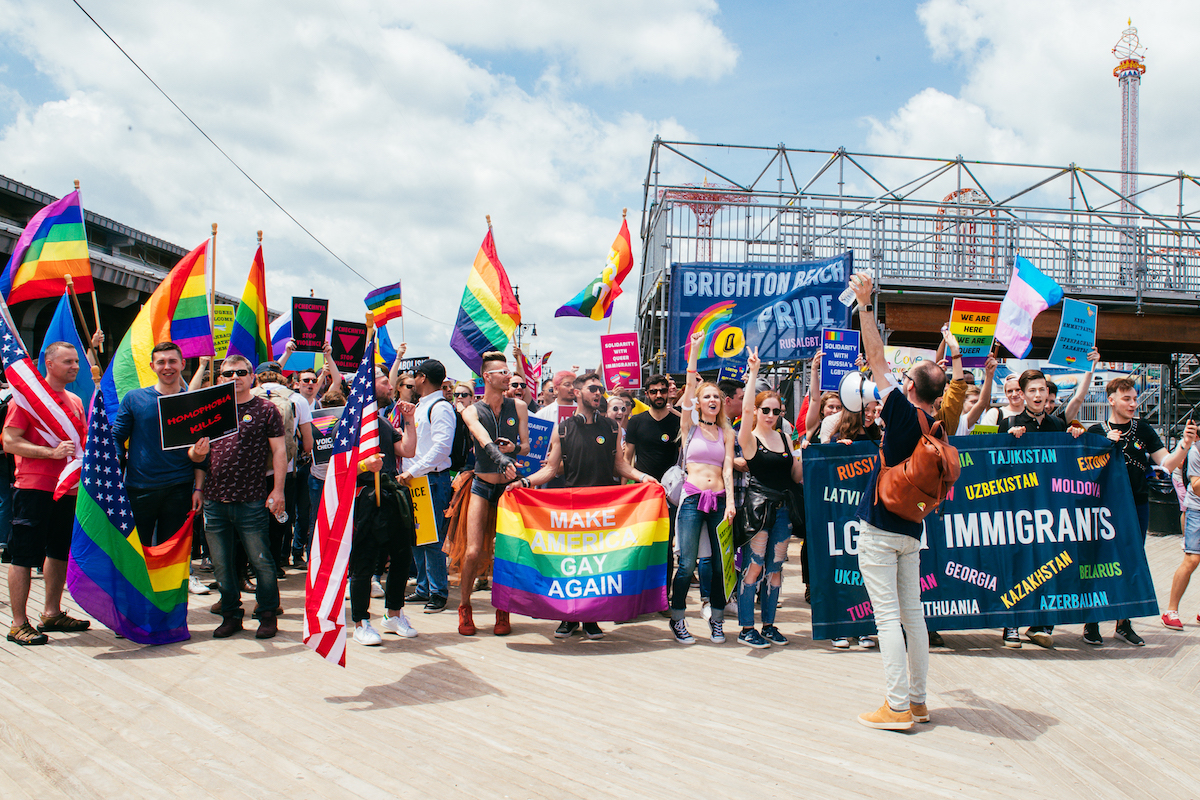
Brighton Beach Pride 2018. Photo by Hunter Abrams
Normally the boardwalk is the domain of chess-playing retirees, beach-going families and babushkas who inch along the promenade with their rolled walkers; that day, it was home to hundreds of marchers holding rainbow flags – and the Uzbek flag, and Ukraine’s flag, and Russia’s flag, and America’s flag. The signs that marchers held showed how the political struggles of LGBT and Muslim and immigrant groups were all connected:
“HELP REFUGEES FROM CHECHNYA”
“SOLIDARITY WITH MUSLIM IMMIGRANTS”
“NYET – FASHISZMU, RASIZMU, ISLAMOFOBII”
For Gorshkov, the aim of this parade is to show the Russian-speaking community that LGBT people are part of that community too. It’s part of a path of slow, incremental progress towards combating homophobia. “They’re already more aware about our existence,” he said. “It’s a long way; it could not be changed in one way or two years.”
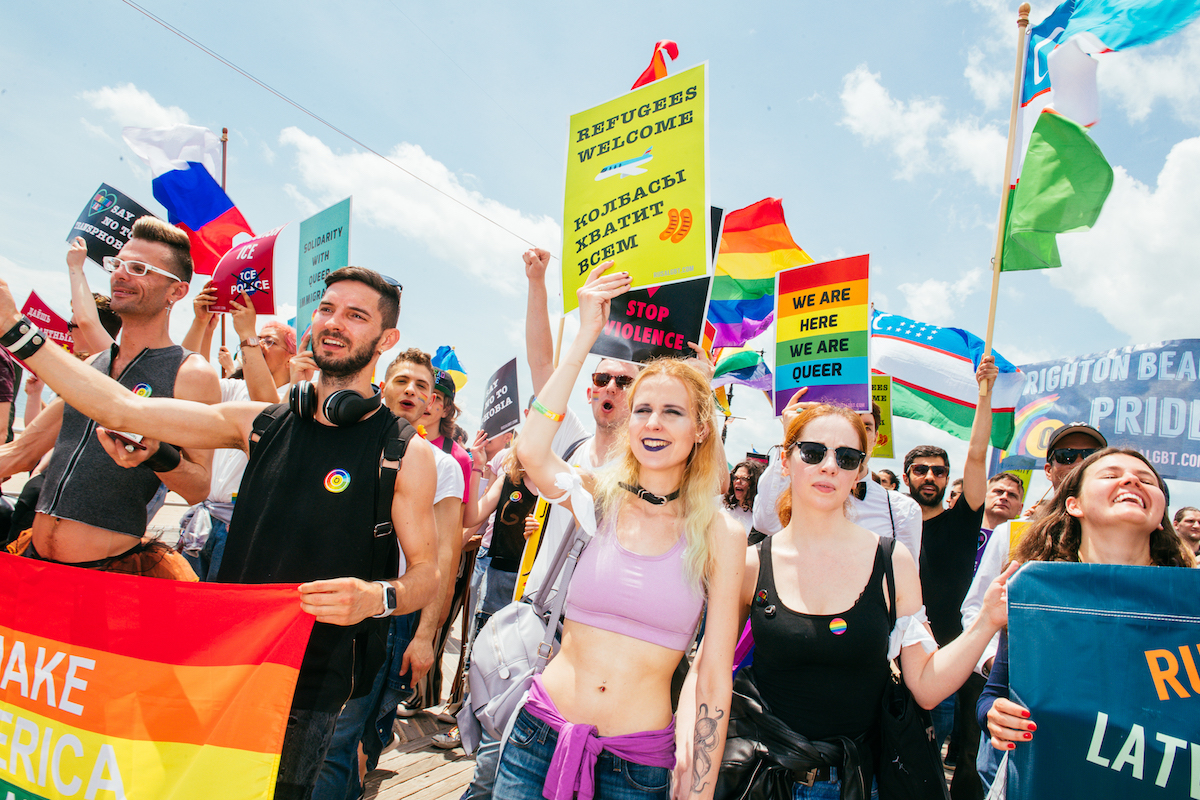
Anastasia Orlova and Elvira Brodskaya at Brighton Beach Pride. Photo by Hunter Abrams.
But after the euphoria of the parade had faded, another incident occurred that illustrated how far groups like RUSA still have to go.
In July, Gorshkov participated in a discussion about poverty in America on RTVI, an international Russian-language TV station. He debated with Malka Shahar, a Russian-American resident of Brooklyn who unsuccessfully ran for state General Assembly in 2016 under the Conservative party. During the debate he accused Shahar of using racist language, since she complained that she “feels like she’s in Africa” when she enters government offices. A few weeks after the episode aired, Gorshkov started getting a slew of online harassment from her supporters. (Some of the comments were deleted, but Gorshkov saved and translated screenshots of the threats.)
“I’ll break your skull…I’ll tear apart your pink ass!” one man threatened in Russian. Another man called for gays to be lynched. One commenter sneered: “That homo is calling for refugees as fresh meat for the local faggots.”
The hatred didn’t surprise Gorshkov, who has contacted police about the threats.
“It was always like that,” he said, adding, “Of course, the current political climate has empowered them more.”
Gorshkov was already planning to organize a town hall meeting on LGBT issues with the Russian-speaking community in the fall. This incident only served to convince him that “we need to double our efforts.”
“It is my country now, and for God’s sake we still have laws against discrimination.”
The threats shook members of RUSA, especially those with memories of violence in their own past.
“When situations like with Malka happen, I feel helpless and also full of rage,” Brodskaya wrote in an email. “It is my country now, and for God’s sake we still have laws against discrimination.”
Despite the political climate, Brodskaya says she feels more welcome in America than she did in her home country. She still believes that there “a lot of wonderful and kind people who are tolerant.” That makes it all the more important to speak out against those who are not; to signal to other LGBT people that they are not “alone and helpless” when facing homophobia.
“I feel that I must not be silent,” she wrote, “because there is nowhere to run now.”



This is a great article, thanks!
“You can often see simple people with simple smiles,” Brodskaya had said. “And they talk to each other, they smile and they laugh and you literally see that they are in a good mood. And that’s all great, but also I often feel sadness because I think, ‘I will never be like them. Never.’ Though I can live here, I can work here, have a house here, but my mind is not like theirs. Because we all come here with a little war inside and it never stops.”
This is so true. I’m from south america and i feel like i could live out the rest of my life in europe, never having the kind of relaxed joy people who were born on welfare states have.
Thank you for this beautiful article. This kind of reporting is one of the main reasons why I love Autostraddle so much.
thank you for this, such an interesting read and so in depth! would love to see more content like this on autostraddle, particularly about lgbt asylum seekers and refugees.
This was such an insightful read. Thank you for writing this and thank you Autostraddle for publishing content like this.
Sharon, great reporting about an important subject – thank you. I hope you’ve let the people you interviewed know about Autostraddle. They would find a welcome from the community here. Maybe one of them would even want to write something?
That would be so cool
Otlichno — spasibo!
Thanks Sharon! Such an important article. I hope they all get asylum.
Thank you for your reporting—this was an interesting and humanistic look into a community I don’t know much about. So many feels.
Incredible reporting. I hope to see more from you!
“And they talk to each other, they smile and they laugh and you literally see that they are in a good mood. And that’s all great, but also I often feel sadness because I think, ‘I will never be like them. Never.’ Though I can live here, I can work here, have a house here, but my mind is not like theirs“
So so so true
Thank you for this. It’s important to publish articles like this, thank you Autostraddle.